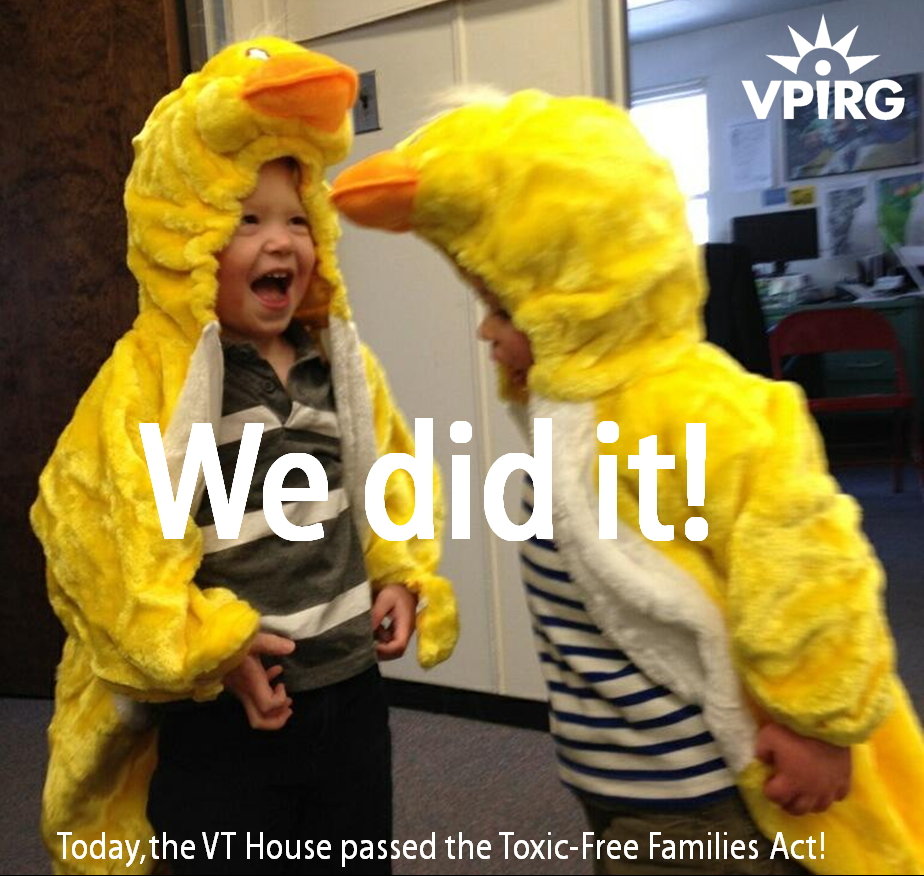The Vermont House of Representatives voted 120 to 20 today in favor of a bill (S.239) designed to protect children from exposure to toxic chemicals found in everyday products.
“This is really an incredible win for children and families in Vermont,” said Paul Burns, Executive Director of VPIRG. “Under this law, kids in Vermont will soon be better protected from the dangerous toxins used in everything from teething rings to teddy bears.”
Since 2005, Vermont has taken action to restrict the use of at least half a dozen toxins, including lead, mercury, phthalates, toxic flame retardants and BPA. But there are literally thousands of additional children’s products on the market containing potentially dangerous chemicals.
“After years of banning one toxic chemical at a time, it’s exciting to see the Vermont House move forward with a better approach to protecting our children from harmful chemicals,” said Lauren Hierl, Political Director of Vermont Conservation Voters. “This bill will give Vermonters more information on where toxic chemicals are being used, and since no parent should have to shop their way around dangerous products, the program will ultimately lead to safer, healthier children’s products on our store shelves.”
Modeled on chemical safety programs already in place in several states, the House version of S.239 will:
- Establish a list of dangerous toxins still used in products (beginning with the list of chemicals of high concern to children currently in use in Washington State),
- Require businesses that sell children’s products containing one or more of those chemicals to report to the state and pay a small fee, and
- Give experts at the Vermont Department of Health the authority to regulate the toxins on the list that are used in children’s products.
“We see far too many firefighters leaving the profession with occupational illnesses, and studies link them to the harmful and unnecessary chemicals targeted by this bill,” said Ben O’Brien, President of the Professional Fire Fighters of Vermont.
Chemicals used in children’s products have been linked with asthma, developmental disorders, infertility, cancer and other harmful health effects.
“The passage of this bill shows lawmakers are serious about addressing public health concerns and reducing unnecessary exposure to dangerous chemicals,” said Nick Carter of Planned Parenthood of Northern New England. “The scientific evidence over the last many years shows that exposure to toxic chemicals can have significant and long-lasting effects on reproductive health, and lawmakers did right by Vermont families by acting on this important issue.”
Some companies are already responding to consumer demand for safe and healthy products. For instance, Vermont’s own Seventh Generation continues to grow based on a model that seeks to avoid all use of toxic chemicals in its products.
“By supporting this proposed legislation, we’ll yet again assert our leadership as the Green Mountain state, an incubator for socially responsible business,” said John Replogle, CEO of Seventh Generation. “As business leaders in the state of Vermont, we need to make sure that we’re thinking about protecting our own, the citizens of Vermont, from toxic chemical exposure.”
But not all businesses favored the idea of eliminating toxic substances from children’s products. In fact, groups like Associated Industries of Vermont, American Petroleum Institute and even the Toy Industry Association all had paid lobbyists working to defeat Vermont’s bill.
“I guess we kind of expect Associated Industries and Big Oil to oppose children’s protection legislation, and that’s bad enough,” said Burns. “But when toy makers care more about defending the toxic chemicals in their products than the children who play with them, then I think they ought to reconsider their line of work.”
“We thank House champions of this legislation, including Representatives David Deen, Willem Jewett, Kate Webb, Jill Krowinski, Jim McCullough, and Ann Pugh,” added Hierl.
The legislation must now be reconciled with a version that passed the Vermont Senate earlier this session before moving to the governor for his signature. The process will need to move quickly as the Legislature is due to adjourn by May 10th.
# # #

